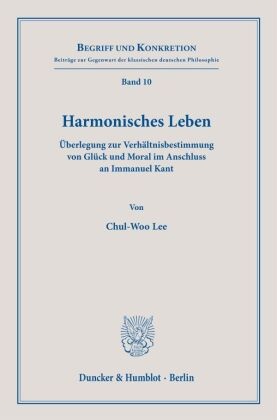Harmonisches Leben. - Überlegung zur Verhältnisbestimmung von Glück und Moral im Anschluss an Immanuel Kant.. Dissertationsschrift
| Verlag | Duncker & Humblot |
| Auflage | 2023 |
| Seiten | 324 |
| Format | 16,0 x 2,2 x 23,5 cm |
| Gewicht | 592 g |
| Reihe | Begriff und Konkretion 10 |
| ISBN-10 | 3428187024 |
| ISBN-13 | 9783428187027 |
| Bestell-Nr | 42818702A |
Die Arbeit legt die ethische Verhältnisbestimmung von Glück und Moral bei Kant dar. Die These der Arbeit lautet, dass Kant im Unterschied zur Unvereinbarkeitsthese, Dissonanzthese und Koinzidenzthese des Verhältnisses von Glück und Moral eine dissonante Harmoniethese vertritt als plausibelste Antwort auf die fundamentalethische Grundfrage, ob und inwiefern die Moral zum Glück führen kann. Damit wird die aktuelle ethische Relevanz der kantischen autonomen Moral für das Glück als gutes Leben aufgezeigt.
Die Arbeit untersucht systematisch die ethische Verhältnisbestimmung von Glück und Moral im Anschluss an Kants autonomes Moralsystem. Hierbei thematisiert die Arbeit nicht die begründungs- und motivationstheoretische Bedeutung des Glücks für die Moral, sondern erweist den handlungstheoretisch-existentiellen Sinn der Moral für das Glück als gutes Leben. Die Untersuchung erhellt somit die aktuelle ethische Relevanz der kantischen autonomen Moral für das Glück als gutes Leben, welches das allerletzte Handlungsziel des menschlichen Daseins ist. Die These der Arbeit lautet, dass Kant im Unterschied zur Unvereinbarkeitsthese, Dissonanzthese und Koinzidenzthese des Verhältnisses von Glück und Moral eine dissonante Harmoniethese vertritt als plausibelste Antwort auf die fundamentalethische Grundfrage, ob und inwiefern die Moral zum Glück führen kann.
Inhaltsverzeichnis:
Einleitung
I. Kant über Glück und Moral: Glück kontra Moral?
Überblick über die Verhältnisbestimmung von Glück und Moral - Dissonantes Harmoniemodell: Ein ursprünglich kantisches Modell?
II. Kants Verhältnisbestimmung von Glück und Moral in seinem autonomen Moralsystem
Eine kurze systematische Darstellung des Moralsystems in den »Vorlesungsschriften über Moralphilosophie« Kants - Glück und Moral in der Begründungsfrage der Moralität - Glück und Moral in der Motivationsfrage der Moralität - Glück und Moral in der Sinnfrage der Moralität - Ausblick: Harmonisches Leben. Glück und Moral bei Kant
Literatur-, Personen- und Stichwortverzeichnis
»Harmonious Life. Reflection on Determining the Relationship between Happiness and Morality in Connection to Immanuel Kant«: The study investigates the ethical relationship between happiness and morality in Kant, and argues for the following claim: While rejecting an Incompatibility-Thesis, a Dissonance-Thesis and a Coincidence-Thesis Kant defends a dissonant Harmony-Thesis as the most plausible answer to the fundamental ethical question whether and to what extent morality can lead us to happiness. It thus updates the ethical relevance of Kant's autonomous morality for happiness as a good life.

